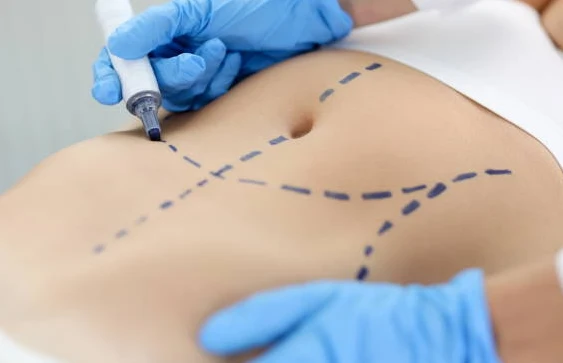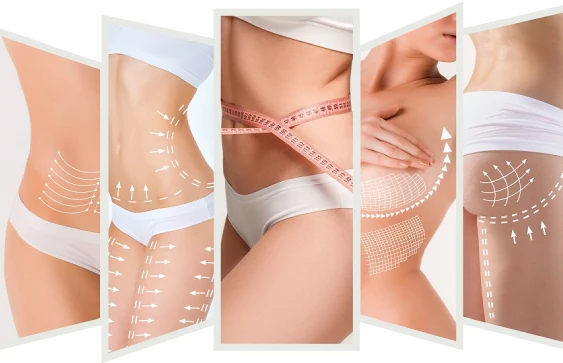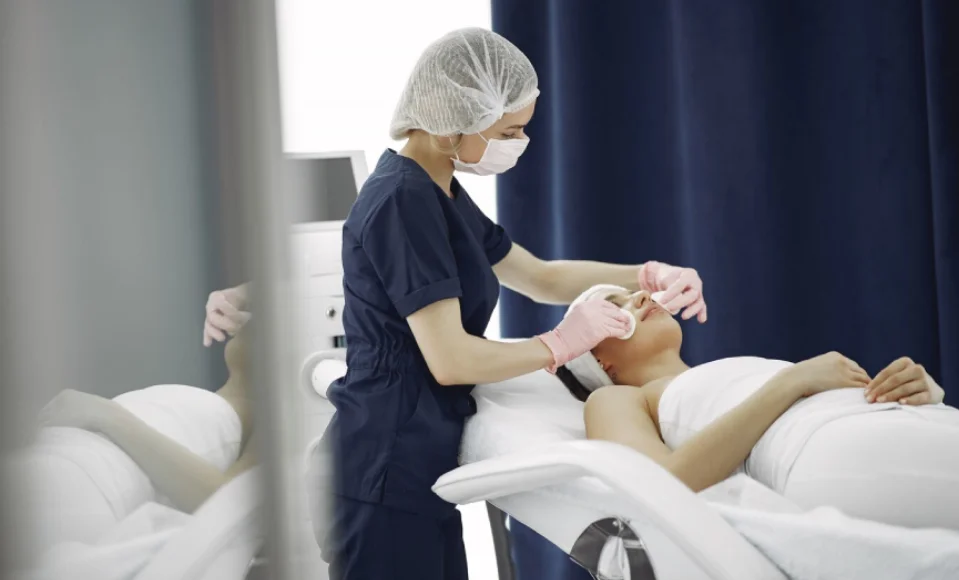
What is a body lift?
A body lift improves the shape and tone of the underlying tissue that supports skin and fat. Excess sagging skin and fat are removed and the procedure(s) can improve a dimpled, irregular skin surface.
A body lift may include these areas
- Abdominal area – locally or extending around the sides and into the lower back area
- Buttocks
- Thigh – the inner, outer or posterior thigh, or the thigh’s circumference
What a body lift can’t do
Body lifts are not intended strictly for the removal of excess fat. Liposuction alone can remove excess fat deposits where skin has good elasticity and is able to naturally conform to new body contours. In cases where skin elasticity is poor, body lift techniques along with liposuction may be recommended.


FAQ
Frequently Asked Questions
In general, body lift candidates include:
- Individuals with significant soft tissue looseness in one or multiple body areas
- Healthy individuals without medical conditions that impair healing or increase risk of surgery
- Individuals with a positive outlook and realistic goals for what body lift surgery can accomplish
- Nonsmokers
- Individuals committed to leading a healthy lifestyle with proper nutrition and fitness
The average cost of lower body lift surgery is $9,449, according to the latest statistics from the American Society of Plastic Surgeons. This average cost is only part of the total price – it does not include anesthesia, operating room facilities or other related expenses. Please consult with your plastic surgeon’s office to determine your final fee.
A surgeon’s cost will be based on his or her experience, the type of procedure(s) used and the geographic office location. Most health insurance does not cover body lift surgery or its complications, but many plastic surgeons offer patient financing plans, so be sure to ask.
Body lift costs may include:
- Anesthesia fees
- Hospital or surgical facility costs
- Medical tests
- Post-surgery garments
- Prescriptions for medication
- Surgeon’s fee
When choosing a board-certified plastic surgeon in your area for a body lift, remember that the surgeon’s experience and your comfort with him or her are just as important as the final cost of the surgery.
During your body lift surgery consultation be prepared to discuss:
- Your surgical goals
- Medical conditions, drug allergies and previous medical treatments
- Current medications, vitamins, herbal supplements, alcohol, tobacco and drug use
- Previous surgeries
Your plastic surgeon will also:
- Evaluate your general health status and any pre-existing health conditions or risk factors
- Examine and measure your body, this may include detailed body measurements
- Take photographs for your medical records
- Discuss your body lift options
- Recommend a course of treatment
- Discuss likely outcomes of body lift surgery and any risks or potential complications
The success and safety of your body lift procedure depend on your complete candidness during your consultation. You will be asked a number of questions about your health, desires and lifestyle.
Be sure to ask questions. To help, we have prepared a checklist of questions to ask your body lift surgeon that you can take with you to your consultation.
It’s very important to understand all aspects of your body lift procedure. It’s natural to feel some anxiety, whether it’s excitement for your anticipated new look or a bit of preoperative stress. Don’t be shy about discussing these feelings with your plastic surgeon.
Use this checklist as a guide during your body lift consultation:
- Are you certified by the American Board of Plastic Surgery?
- Were you specifically trained in the field of plastic surgery?
- How many years of plastic surgery training have you had?
- Do you have hospital privileges to perform this procedure? If so, at which hospitals?
- Is the office-based surgical facility accredited by a nationally- or state-recognized accrediting agency, or is it state-licensed or Medicare-certified?
- Am I a good candidate for this procedure?
- What will be expected of me to get the best results?
- Where and how will you perform my procedure?
- What surgical technique is recommended for me?
- How long of a recovery period can I expect, and what kind of help will I need during my recovery?
- What are the risks and complications associated with my procedure?
- How are complications handled?
- How can I expect my body to look over time? After pregnancy?
- What are my options if I am dissatisfied with the cosmetic outcome of my body lift?
- Do you have before-and-after photos I can look at for this procedure and what results are reasonable for me?
The decision to have plastic surgery is extremely personal. You will have to decide if the benefits will achieve your goals and if the risks and potential complications of body lift surgery are acceptable.
Your plastic surgeon and/or staff will explain in detail the risks associated with surgery. You will be asked to sign consent forms to ensure that you fully understand the procedure you will undergo and any risks or potential complications.Possible body lift surgery risks include:
- Anesthesia risks
- Asymmetries
- Bleeding (hematoma)
- Deep vein thrombosis, cardiac and pulmonary complications
- Fatty tissue under the skin might die (fat necrosis)
- Fluid accumulation
- Infection
- Numbness or other changes in skin sensation
- Pain, which may persist
- Persistent swelling in the legs
- Poor wound healing
- Possible need for revisionary surgery
- Recurrent looseness of skin
- Skin discoloration and/or prolonged swelling
- Skin loss
- Sutures may spontaneously surface through the skin, become visible or produce irritation and require removal
- Unfavorable scarring
These risks and others will be fully discussed prior to your consent. It is important that you address all your questions directly with your plastic surgeon.
In preparing for body lift surgery, you may be asked to:
- Get a lab test or a medical evaluation
- Take certain medications or adjust your current medications
- Stop smoking
- Avoid taking aspirin, anti-inflammatory drugs and herbal supplements and other medications that may increase bleeding
Body lift surgery may be performed in an accredited office-based surgical facility, ambulatory surgical center or a hospital.
If your body lift is performed on an outpatient basis, be sure to arrange for someone to drive you to and from surgery, and to stay with you for at least the first night following surgery.
